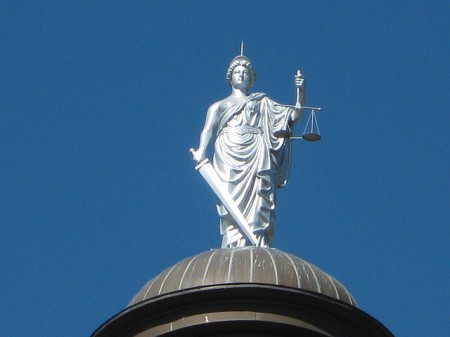
As the International Criminal Court (ICC) starts an investigation into its most high-profile suspect yet – Libya’s “Brother Leader” Muammar Gaddafi – politicians in a far more democratic country, 2,700 miles to the southeast, are also looking to evade the long arm of the law.
Kenya became the 98th member of the International Criminal Court in March 2005, when it ratified the Rome Statute. Over the past three months, the ICC has issued Kenya with summonses for the ‘Ocampo Six’: six individuals, both in and out of government, deemed by Chief Prosecutor Louis Moreno Ocampo to be those most responsible for the post-electoral violence that unfolded in 2007-08, leaving an estimated 1,500 people dead.
Is it really necessary for the ICC to be involved? Could Kenya not prosecute those involved on a purely domestic level? Yes, it could: but only with an adequate institutional framework in place. The Rome Statute provides for the legal principle of complementarity; that is, legitimate local efforts at justice enjoy primacy over international efforts. Politicians in Nairobi, however, have botched various attempts to establish a local tribunal, or to reform their judicial system. Imenti Central MP Gitobu Imanyara has spearheaded the campaign to establish a local tribunal that would meet international standards – in essence, removing the need for ICC involvement. A copy of his bill can be found here. Three attempts to pass the legislative text – February 2009, August 2009 and February 2011 – were, however, defeated as a result of parliamentary infighting.
As a result, the Ocampo Six have all but assured themselves lengthy sojourns behind bars, if brought to trial and convicted by the ICC instead of domestically. The upside for Kenya and its people, who, thanks to a remarkably vocal and independent press, have access to quality reporting – and broadly back the ICC as they don’t trust many of their own leaders’ commitment to justice – is that the intervention stands to seriously curb impunity.
Now, astonished that Mr Ocampo hasn’t given up, some Kenyan politicians from the PNU faction have taken to lobbying the US and the UN for an Article 16 one-year deferral of the investigation. The Parliament also passed a conspicuously desperate vote calling on the country to withdraw from the ICC. This would not halt the ongoing investigation though, even if enacted into law. Indecision has cost the ‘Ocampo 6’ any hope, however slight, of bending the administration of justice.
On a tangential note, it is worth briefly comparing Washington’s supportive stance (however morally justified) on the Kenya, Libya (a potentially significant precedent-setter) and Darfur dossiers with its own arms-length conduct presently, and downright hostility under President Bush, vis-à-vis the ICC, as the exercise exposes its application of double standards. For that matter, so do Beijing and Moscow’s positions on Darfur and Libya. But great powers don’t subject themselves to the rule of law; they mostly impose it.

